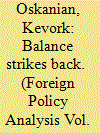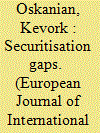|
|
|
Sort Order |
|
|
|
Items / Page
|
|
|
|
|
|
|
| Srl | Item |
| 1 |
ID:
148157


|
|
|
|
|
| Summary/Abstract |
Tbilisi’s recent foreign policy presents analysts working from a balance-of-power perspective with something of a puzzle: with Russia very much the regionally dominant power, against the predictions of structural-systemic theories, small state Georgia has ended up balancing against, rather than bandwagoning with, great power Moscow. As a result, domestic, ideological explanations that implausibly ignore or minimize interstate considerations of power have predominated in analyses of Tbilisi’s foreign policy. In response, this essay examines Georgia’s post-Soviet foreign policies from a neoclassical realist theoretical viewpoint, combining systemic, balance-of-power and domestic ideological factors: throughout the period under review, Tbilisi’s policies were thus due to ideologically conditioned perceptions of shifting power-political realities in its neighborhood, with an ideological adherence to liberal norms playing a particularly important role in distorting these perceptions during the Saakashvili administration. Through this combination of power and ideology, neoclassical realism ends up providing a more comprehensive and continuous account of Tbilisi’s shifting policies since 1992 than either domestic or alternative realist frameworks, like balance-of-threat theory, or omnibalancing; as an important implication, Georgia’s, and other former Soviet states’ continued pro-Western orientation will depend as much on their perceptions of the West’s continued commitment to regional power projection as on domestic ideological preferences.
|
|
|
|
|
|
|
|
|
|
|
|
|
|
|
|
| 2 |
ID:
181131


|
|
|
|
|
| Summary/Abstract |
This article contributes a securitisation-based, interpretive approach to state weakness. The long-dominant positivist approaches to the phenomenon have been extensively criticised for a wide range of deficiencies. Responding to Lemay-Hébert's suggestion of a ‘Durkheimian’, ideational-interpretive approach as a possible alternative, I base my conceptualisation on Migdal's view of state weakness as emerging from a ‘state-in-society's’ contested ‘strategies of survival’. I argue that several recent developments in Securitisation Theory enable it to capture this contested ‘collective knowledge’ on the state: a move away from state-centrism, the development of a contextualised ‘sociological’ version, linkages made between securitisation and legitimacy, and the acknowledgment of ‘securitisations’ as a contested Bourdieusian field. I introduce the concept of ‘securitisation gaps’ – divergences in the security discourses and practices of state and society – as a concept aimed at capturing this contested role of the state, operationalised along two logics (reactive/substitutive) – depending on whether they emerge from securitisations of the state action or inaction – and three intensities (latent, manifest, and violent), depending on the extent to which they involve challenges to state authority. The approach is briefly illustrated through the changing securitisation gaps in the Republic of Lebanon during the 2019–20 ‘October Uprising’.
|
|
|
|
|
|
|
|
|
|
|
|
|
|
|
|
|
|
|
|
|